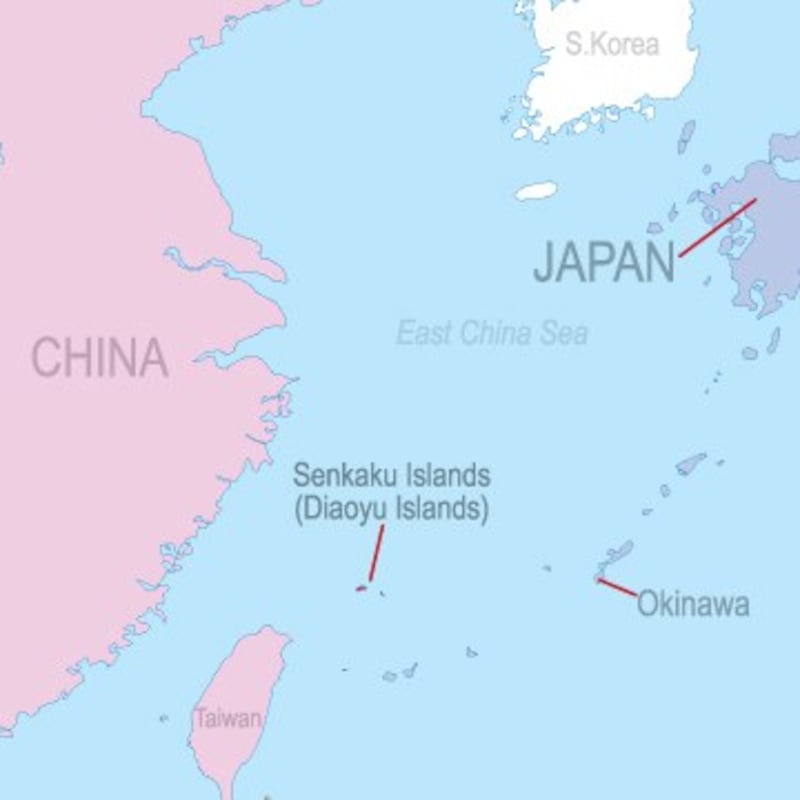A nonmilitary Chinese plane was spotted in airspace over a group of islands at the center of a territory dispute between Beijing and Tokyo on Thursday, prompting a formal protest from Japan, though China has maintained that the aircraft was simply conducting “normal operations.”
The incident, which falls on the anniversary of the 1937 Nanjing Massacre by Japanese troops in China, marks the latest confrontation in the dispute over territory in the East China Sea, which has heated up as the two countries take a more nationalistic stance during a time of changing leadership.
The nonmilitary Chinese plane allegedly entered Japanese airspace at around 11:00 a.m. Japan time, causing Tokyo to scramble several F15 fighters to the area from Okinawa, according to the Japan Coast Guard. But when the jets arrived, the aircraft had already left the area, it said.
Japan’s defense ministry said was the first time that a Chinese airplane had intruded into airspace Tokyo has claimed since at least 1958, although Chinese ships have frequently entered the area by sea.
The Japan Coast Guard said it had spotted the Chinese aircraft about 15 kilometers (nine miles) south of the Senkaku Islands, also known as the Diaoyu Islands in China, and had issued a warning to the pilot.
It said the pilot had responded that the plane was in Chinese airspace.
Less than ten minutes later, the aircraft had returned to China before Japanese jet fighters could intercept it, the Coast Guard said.

Chief Cabinet secretary Osamu Fujimura said Japan had lodged an official protest and summoned the Chinese ambassador in Tokyo.
"It is extremely deplorable that China's official airplane conducted an airspace invasion of Japan’s territory today, on top of their intrusion of territorial waters," he said in a statement.
Chinese Ministry of Foreign Affairs spokesman Hong Lei said Thursday that the area was in China’s “inherent territory” and that the country’s maritime surveillance aircraft “cruising in the waters of the Diaoyu Islands” was “absolutely normal.”
“China urges Japan to stop the illegal actions in the waters and airspace of the Diaoyu Islands,” he told a press briefing in Beijing.
The Associated Press quoted U.S. Assistant Secretary of State Kurt Campbell as urging calm, while noting the U.S. does not "take a position on the sovereignty of these islands."
"The security treaty between the United States and Japan applies to any provocative set of circumstances," he told reporters at the U.S. Embassy in Kuala Lumpur during an Asian tour.
"We are encouraging all sides to take appropriate steps so that there will be no misunderstanding or miscalculation that could trigger an environment that would be antithetical to peace and stability."
The sparring over the uninhabited islands in the East China Sea has become increasingly frequent in recent months in the midst of political transitions in both China and Japan.
The Chinese Communist Party’s new general secretary, Xi Jinping, who ascended to power during a once-in-a-decade leadership change during the 18th National People’s Congress last month, has positioned himself as a defender of Chinese sovereignty.
Japanese opposition leader and former Prime Minister Shinzo Abe has been targeting China during his campaign for the country’s general election on Sunday. He has called for an amendment to Japan’s constitution that would give additional powers to the country’s Self-Defense Forces.
The territorial row escalated after Tokyo bought the disputed islands from a private Japanese owner in September, triggering violent protests and calls for boycotts of Japanese products across China.
China is also embroiled in disputes over potentially gas- and oil-rich islands in the South China Sea that have roiled tensions with its Southeast Asian neighbors. China, Brunei, Malaysia, the Philippines, and Taiwan have overlapping claims in the waters.
Reported by RFA’s Mandarin Service. Translated by Xiaoming Feng. Written in English by Joshua Lipes.
